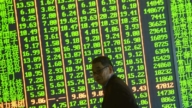【新唐人2014年07月10日訊】日前,中共官員在會議上表示,中國金融領域有五大風險點集中顯現,其中以房地產資金鏈風險最為嚴重。業內分析人士認為,一旦某個領域風險集中爆發,就可能對中國經濟走向造成影響。專家指出,房市崩盤將引發金融危機。
中共人大財經委員會副主任委員、經濟學家辜勝阻,日前在中共人大常委會第九次會議上表示,中國金融領域有五大風險點集中顯現,一是房地產市場拐點可能引發的金融風險。二是區域性的地方政府性債務風險較為突出。三是產能過剩領域可能引發的金融風險。四是影子銀行中的金融風險。五是流動性錯配的結構性風險,而流動性總量過多又和實體經濟融資並存。
旅美經濟評論家馬傑森:「他所謂的,說的只是一個大家都能夠看得見的事實,其實大家真正關心的是到底中國地方債務是多少,影子銀行到底牽扯多大的比例,這些具體的數字其實是讓國際經濟學家或獨立經濟學家能夠對經濟發展做出更準確判斷的東西。」
辜勝阻說,在5大金融風險中,房地產資金鏈風險最為嚴重。
據大陸媒體報導,今年上半年,一線城市住宅成交量暴跌三至四成,而北京的跌幅最高。截至6月26號,北京今年新建住宅合計簽約22,782套,相比去年同期,下滑48.77%。簽約套數和簽約面積創下近9年來同期最低值。
據了解,今年上半年,廣州全市11區一手住宅成交面積為382萬多平方米,同比去年下跌30.4%。而《搜房網》數據監控中心統計顯示,今年上半年,深圳全市商品住宅纍計成交的面積和套數,同比去年上半年分別下降40.28%、和42.09%。
北京大學光華管理學院博士生導師王建國:「房地產崩盤的話,對中國經濟非常危險,它會導致金融危機。」
今年初開始,中國的房地產企業破產消息不斷傳出。據不完全統計,僅今年3月以來,被曝光的這類案例就有10多起,涉及浙江、江蘇、安徽、湖北、陝西、海南等多個省份。
而浙江奉化和杭州市的兩家開發地產公司,因為貸款違約,不但在建項目已經停工,兩地的相關部門還以「非法集資」的罪名,拘留了這兩家公司的高管。
中國一線城市也同樣發生房地產商資金鏈斷裂的情況。如,身處上海繁華地段的「國際廣場」項目,因為開發商資金鏈斷裂,5月已經停工,鬧市區的在建工地被法院封存。
央行副行長潘功勝在6月的一個會上表示,一個國家的國民,如果主要以住房的形式儲藏財富,可能導致房地產泡沫破裂,甚至經濟危機。
馬傑森:「中共確確實實是成功的在過去十幾年,把老百姓一直忽悠到房市和股市裡頭,因為其他的投資方式也沒有,它會不會接著忽悠老百姓,接著用房地產作為投資方向。」
除了央行要求各商業銀行及時發放購房貸款外,今年上半年,地方政府刺激房地產市場的政策也在不斷出爐。
最近,武漢市房管局著手放寬本地居民第三套房,和外地人購買二套房的有關政策﹔還限制首套貸款利率不下浮的銀行承接房貸業務﹔同時嚴禁開發商降價,如果開發商降價15%將會面臨「談話」、如果降價20%,則將停止網上簽購。
房地產業,在整個產業鏈中的影響,非常全面,前端是原材料,如鋼材、水泥、建材,中間產品是設計、建築工程、裝修,最後形成的商業建築物業和住房,拉動著市場活動的方方面面。
財政部「財政科學研究所」所長賈康認為,政府不會坐視不動產業大起大落。
旅美經濟學者馬傑森指出,面對影子金融領域5大風險,最後中共一定還是會採取大量印製鈔票的方式,逼迫全體民眾買單。
採訪編輯/劉惠 後製/李勇
Five Significantly Risky Occurrences In Finance Trigger Housing Market, Economic Crisis
Recently, Chinese officials said in a meeting that the financial
sector is focused on five major risks.
The most serious risk is property capital chain.
Experts analyze that any outbreak would impact
China’s economic trend.
A housing market crash will trigger a financial crisis.
China-based economist Gu Shengzu said at the Ninth
People’s Congress that five major risk areas in
China’s financial sector have occurred simultaneously.
First, risks in the real estate finance market may arise.
Second, the regional local government debt risk
has grown more prominent.
Third, excess capacity in the finance sector may arise.
Fourth, the shadow banking risk may arise.
Fifth, the coexistence of a structural liquidity mismatch risk,
excessive liquidity and the entire funding of the real economy.
Jason Ma, US-based economic commentator: “What he said
was a fact that everyone can see.
Most concerning to everyone is the large amount of local
debt, and the large percentage shadow banking takes.
These real figures would give international economists
or mainstream economists a chance to accurately assess
economic development.”
Gu Shengzu says that among the five risks,
property capital chain is the most serious.
Chinese media reported that the housing turnover in first-tier
cities dropped by 30 to 40 percent in the first half of this year.
Beijing is the worst.
As of June 26, only 22,782 new residential home units sold
in Beijing, a decline of 48.8 percent year-on-year.
The sale of residential units and commercial properties
hit a nine-year low year-on-year.
Sources say that in the first half of this year, a 30.4 percent
year-on-year decline took place in 11 Guangzhou districts
selling newly built homes within a 3.82 million square
meter area.
A soufun.com statistic shows that in the first half of this year,
Shenzhen commercial and residential sales decreased
by 40 and 42 percent.
Wang Jianguo, Professor of Peking University:
“A real estate market crash will be very dangerous
to China’s economy and will cause financial crisis.”
At the start of the year, bankruptcy in China’s real estate
businesses was a consistent occurrence.
According to incomplete statistics, since March, over 10
bankruptcy cases occurred in Zhejiang, Jiangsu
and other provinces.
Loan defaults in two real estate companies in Fenghua city,
Zhejiang and Hangzhou city have brought construction
projects to a halt.
Executives were detained and accused
of illegal fundraising.
Real estate companies in first-tier cities also
encountered a capital chain outbreak.
In Shanghai, the Shimao International Plaza project came
to a halt in May when a developer capital chain fell apart.
The construction site was sealed by court.
Pan Gongsheng, deputy director of China’s Central Bank,
said in a June seminar that relying on home buying
as an investment could cause a housing bubble burst
and an economic crisis.
Jason Ma: “Over the past dozens of years, the Chinese
Communist Party (CCP) successfully fooled people into
investing in the housing market and the stock market
because there are no other investment methods.
Will the CCP continue to fool its people and have people
invest in real estate?”
In addition to the Central Bank request for commercial banks
to issue home loans timely in the first half of this year,
the local government consistently released policies
to stimulate the housing market.
Wuhan Housing Management Bureau relaxed a third home
purchase policy on residents as well as a policy
for non-residents to purchase a second home.
The bureau also requested banks not to reduce
first mortgage rates to take a mortgage loan business.
Meanwhile, the bureau prohibited developers
from dropping prices.
Developers who reduce the price by 15 percent
will be given a verbal warning.
A reduction of 20 percent will cause the closure
of their online sales.
The impact on the entire real estate chain
has been comprehensive.
The front-end is raw material – steel, cement,
building materials.
The intermediate products are design,
construction projects, and décor.
The finished product is completed buildings and homes.
Thus, the real estate sector is linked to all aspects
of marketing activities.
Jia Kang, director of the Research Institute for Fiscal Science
at the Ministry of Finance, said that the government
will not ignore the real estate sectors’ tremendous fall.
Jason Ma says that regarding the five financial risks,
the central regime would likely print a large amount
of currency, forcing the people to foot the bill.
Interview & Edit/Liu Hui Post-Production/Li Yong



























